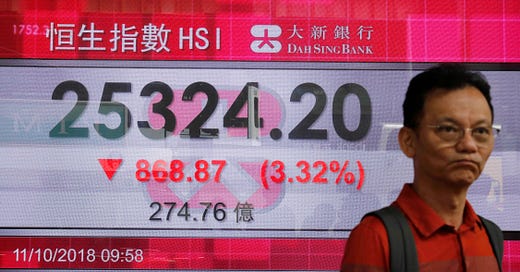Emerging Markets Daily - February 26
Asian Stocks Plunge in Broad Rout, SE Asia Stocks a Haven from Storm?, China Yuan Steady Rise, India Exits Recession, Argentina-IMF Deal Unlikely by May
The Top 5 Emerging Markets Stories - February 26
Asian Stocks Plunge in Broad Rout, Tech Hit Hardest
“Asian stocks fell the most since March as losses in technology shares deepened amid a global selloff triggered by rising Treasury yields. Taiwan Semiconductor Manufacturing Co., Samsung Electronics Co. and Tencent Holdings Ltd. contributed the most to losses in the MSCI Asia Pacific Index, which dropped as much as 3.2%. A gauge of the region’s technology stocks tumbled more than 4%, also the most since March.”
“Friday’s selloff marks a sharp turnaround for equities which rallied for the most of January and February, pushing the Asian benchmark to a fresh record high. Equity benchmarks in South Korea, Taiwan and Japan slumped more than 3% each this Friday.”
“‘This rise in risk-free rates serves as a trigger to investors who have been looking for a reason for an equity market correction,’ said Tai Hui, chief Asia market strategist at J.P. Morgan Asset Management. ‘The Asian tech sector and outperformers of the past 12 months may also mirror the sharper correction of their US counterparts.’”
“The slump called to mind the painful episode for the region between May and June 2013 when the U.S. Federal Reserve suggested it would start slowly tapering its quantitative easing program and rattled global stocks.”
“On the positive side, central banks in Asia’s emerging economies added $467.7 billion to their foreign-exchange reserves last year, the most since the 2013 temper tantrum. That provides Asia with an important buffer against a recent jump in global bond yields.” Bloomberg reports.
Southeast Asia Stocks May Provide Shelter from Global Equities Storm
“Southeast Asian stocks could be safe havens amid the disruption in global risk assets led by spiking yields, according to market watchers. Some of that confidence is already on display. The benchmark equity gauges of Indonesia, Malaysia and the Philippines were little changed in trading Friday morning despite the sell-off in the U.S. and other large markets. Singapore’s Straits Times Index was down 1%, paring its loss of as much as 1.8%.”
“Southeast Asian stocks should act as safe havens as ‘valuations are not as stretched as they are in the U.S., and have not been hyped up by the retail flows,’ said Gary Dugan, chief executive of the Global CIO Office. ‘Singapore should be a safe harbor as it has a low correlation with U.S. interest rates and has been a marked underperformer.’” Bloomberg reports.
China Allows Steady Rise in Yuan, Pressuring Exporters
“China’s currency has continued to climb in value this year on the back of as strong economic recovery, and Beijing doesn’t appear to be in a hurry to weaken it despite the pressure it is putting on exporters.”
“The yuan has risen more than 9% against the U.S. dollar since June on the back of an export boom and massive investment flows. The greenback has weakened against the backdrop of a feeble U.S. economy and low interest rates, and as investors have moved money into riskier assets around the world.”
“Although the yuan rallied to the strongest level since mid-2018 to 6.46 per dollar, Beijing’s official response has been relatively mild so far. Since last fall, it has made it easier for traders to bet on a weaker yuan, and allowed more domestic financial institutions to move money out of the country to invest in foreign securities.”
“Economists say that Beijing appears to be comfortable with a stronger yuan now in part because it could help rebalance China’s economy toward consumption and make it cheaper for China to import commodities and chips.” The Wall Street Journal reports.
India Exits Recession After Sharp Contraction
“India's gross domestic product expanded 0.4% in the three months ended December, after contracting for two consecutive quarters, according to government data released on Friday. This will help Asia’s third-largest economy exit an unprecedented recession even as it battles new challenges posed by a surge in coronavirus infections. The country's economic growth shrank 7.5% a quarter ago and grew 4.1% in the year-ago period.”
“In its second advance estimates of national accounts, the National Statistical Office (NSO) has projected 8% contraction in 2020-21. The economy had shrunk by an unprecedented 24.4% in the first quarter this fiscal following the coronavirus pandemic and resultant lockdowns. In the second quarter, the GDP contracted 7.5% due to a perk up in economic activities.”
“India is now one of the few major economies to post growth in the last quarter of calendar year 2020, with any improvement in the economy’s performance inversely tied to a drop in Covid-19 infections. But the country has seen an uptick in cases over the last few weeks raising the risk of a new round of localised lockdowns.” Business Standard reports.
Argentina, IMF Unlikely to Complete Replacement Deal by May
“The International Monetary Fund does not have a date yet set for its next visit to Argentina as both sides discuss an expected replacement to a failed 2018 program, a spokesman for the IMF said on Thursday. The parties could next meet in Washington soon, as Argentine Economy Minister Martin Guzman will visit the U.S. capital next month, according to a ministry source with knowledge of the plans.”
“The next meeting in Argentina is, however, up in the air. ‘We don’t have a precise date yet for the next formal IMF mission at this stage,’ said Gerry Rice, the IMF’s head spokesman.”
“Notably Rice, who earlier this month said the IMF would ‘do our utmost’ to meet a timetable for May, stopped referring to May as a target for striking a deal.” Reuters reports.



